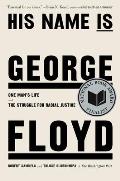2023 Winner of the Pulitzer Prize for Nonfiction
 by Robert Samuels and Toluse Olorunnipa
by Robert Samuels and Toluse Olorunnipa
A landmark biography by two prizewinning Washington Post reporters that reveals how systemic racism shaped George Floyd's life and legacy — from his family's roots in the tobacco fields of North Carolina, to ongoing inequality in housing, education, health care, criminal justice, and policing — telling the story of how one man's tragic experience brought about a global movement for change.
The events of that day are now tragically familiar: on May 25, 2020, George Floyd became the latest Black person to die at the hands of the police, murdered outside of a Minneapolis convenience store by white officer Derek Chauvin. The video recording of his death set off the largest protest movement in the history of the United States, awakening millions to the pervasiveness of racial injustice. But long before his face was painted onto countless murals and his name became synonymous with civil rights, Floyd was a father, partner, athlete, and friend who constantly strove for a better life.
His Name Is George Floyd tells the story of a beloved figure from Houston's housing projects as he faced the stifling systemic pressures that come with being a Black man in America. Placing his narrative within the context of the country's enduring legacy of institutional racism, this deeply reported account examines Floyd's family roots in slavery and sharecropping, the segregation of his schools, the overpolicing of his community amid a wave of mass incarceration, and the callous disregard toward his struggle with addiction — putting today's inequality into uniquely human terms. Drawing upon hundreds of interviews with Floyd's closest friends and family, his elementary school teachers and varsity coaches, civil rights icons, and those in the highest seats of political power, Washington Post reporters Robert Samuels and Toluse Olorunnipa offer a poignant and moving exploration of George Floyd's America, revealing how a man who simply wanted to breathe ended up touching the world.
The Pulitzer Prize has been awarded by Columbia University each spring since 1917. The awards are chosen by a board of jurors for Journalism, Letters, Music and Drama. The awards for Letters include Nonfiction, Poetry, Biography or Autobiography, History, and Fiction.